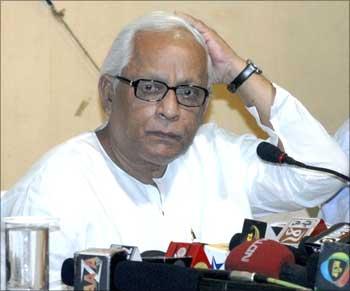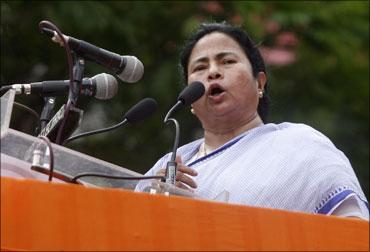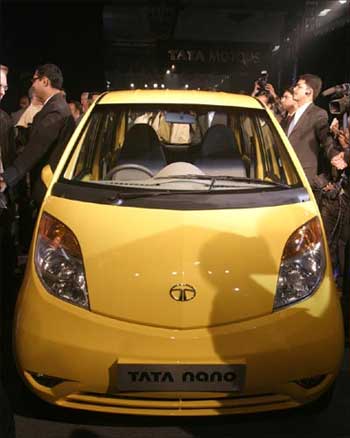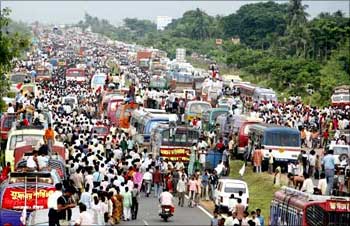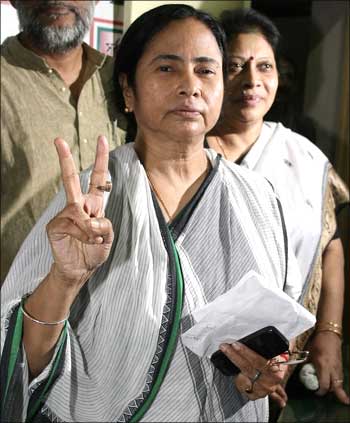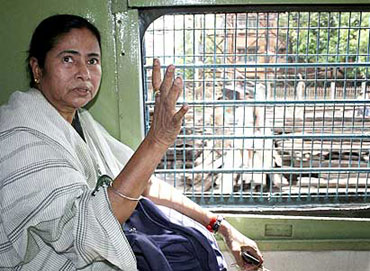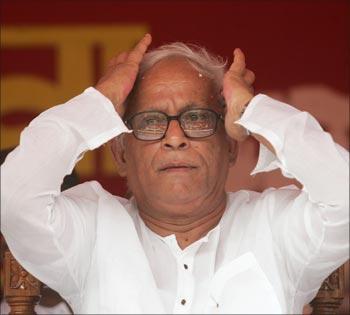 | « Back to article | Print this article |
How could West Bengal's economy be revived?
The 33 years of Left rule has left West Bengal in a state of economic disrepair.
Observers point out that industries in West Bengal have died or run away, the condition of the poor in the state has worsened, new investment is hard to come by, unemployment is rising, development is at a standstill, and while the Left does look at the aam aadmi (in terms of providing cheap rice, etc), nothing much has been done to ameliorate the lot of Bengal's poor.
Given that the elections are round the corner and the Trinamool Congress seems to be gaining ground (alarmingly, if you are a Left supporter), Bengal could well see a change in government for the first time in three decades. As changes wrought by politics go, this would be historic.
Even the Congress is cosying up to the combative Trinamool Congress with Rahul Gandhi touring Bengal to induce people to vote for the TMC-Cong combine. And if the Left were to be voted out of power in West Bengal, analysts believe that Mamata Banerjee could well be the chief minister of West Bengal.
Therefore, a natural question that arises in one's mind is what was it that the Left did not do to bring out more development in the state, and what are the challenges -- or opportunities -- that face whoever is voted to power in Bengal. We asked people from various walks of life about their opinion.
Click NEXT to read what the aam aadmi had to say. . .
How could West Bengal's economy be revived?
Mamata's London dream: How feasible is it?
A recent article in Financial Express states that Union Railway Minister Mamata Banerjee's desire to turn Kolkata into London is a bit too far-fetched, considering the fact that its quality of life is dwindling. But people might just be willing to give her the benefit of doubt.
Riding on the victory at the recently concluded municipal polls, Banerjee announced a host of steps, involving her party's ministries at the Centre to beautify Kolkata.
Strategically, she oversaw a memorandum of understanding between the Kolkata Port Trust, Kolkata Municipal Corporation and the railway ministry to spruce up the riverfront.
She also got Finance Minister Pranab Mukherjee into the loop, saying she looked forward to his 'guidance' for the city's reinvention.
However, Manish Chakraborty, a veteran publisher based in Kolkata, feels, "It is expected of any new party that comes to power next to improve the state of the city. I think it is illogical to presume that Kolkata will ever be at par with London, but we shall all be grateful if the new ruling party that comes to power ensures that the finances of the state stabilise, infrastructure improves and employment opportunities boom."
"It is of utmost importance for the state government to set forth a feasible target and not to dream impossible dreams."
"Kolkata should first be made at par with the A1 cities of India before competing with London or New York," he said.
Click NEXT to read further. . .
How could West Bengal's economy be revived?
Bandhs must be banned
According to a recent Assocham report, frequent bandhs cause the state to lose 12.5 lakh (1.25 million) mandays in 2006, the year for which data about manday losses have been calculated by different state governments.
In the same period, Andhra Pradesh registered manday losses of 240,000, Rajasthan saw 130,000 mandays being lost, and Tamil Nadu lost 70,000 mandays.
In 2006, Tamil Nadu topped the strikes' list, having called 50 bandhs, followed by Bengal (29), Gujarat (23), Andhra Pradesh (18) and Haryana (14).
As for wage loss because of bandhs, Bengal topped this list, registering a total loss of Rs 35.8 crore (Rs 358 million), followed by Andhra Pradesh with Rs 26.3 crore (Rs 263 million), Karnataka with Rs 13.2 crore (Rs 132 million) and Tamil Nadu with Rs 14.9 crore (Rs 149 million).
A parallel survey done by West Bengal Applied Economic Research for 2007 and 2008 had a similar story to tell.
According to it, mandays lost through disruption in Bengal stood at over 30 lakh (3 million) in 2007 and 19.5 lakh (1.95 million) last year.
The figure assume more alarming proportions if one takes into account the fact that there have been more than a dozen bandhs in the past 39 months, excluding those in pockets like the hills and the forests.
Loss incurred by these bandhs would jack up the total loss incurred by West Bengal because of strikes to Rs 11,000 crore (Rs 110 billion) since August 2006.
Of late, Mamata has been saying on every possible platform that she is against bandhs -- if she can implement this one change, if she can motivate people not to shut down the state at every given opportunity, it would be a historic effort towards shifting a mindset.
Says Aparna Mukherjee, an employee of Kolkata-based construction company, "Bandhs can never bring about a solution. I feel ashamed to even count the number of bandhs our country, especially our state, saw in the past one year."
"Strikes stand for waste of time, money and mandays. If there is a bandh over price rise, does it bring down the prices? Never. Rather a day's loss of business adds up to the loss in exchequer thereby fuelling the chance of inflation," she states.
"I appeal to the next government, be it the Left or the Trinamool Congress, to take some concrete steps to put an end to bandhs."
"During a recent bandh by Left Front in Bengal against petrol prices, the state lost Rs 900 crore (Rs 9 billion)," Mukherjee says, adding, "Many despaired that they had lost their day's earnings, with the bandh unlikely to bring down prices."
"The common people of Bengal seem to have grown tired of hartals these days."
Click NEXT to read further. . .
How could West Bengal's economy be revived?
Bengal govt got proposals worth Rs 13,000 crore
It must be remembered that despite the Singur exit, the Bengal government got proposals of Rs 13,000 crore (Rs 130 billion) in investments for 2009.
Now, it's up to the new government, whoever leads it, to seize the day..
In an interview to rediff.com, economist Abhirup Sarkar, however, said that the departure of the Tatas from Singur did not have much impact on the people of the state.
A huge number of factories in Bengal suffered closure because of Left-backed unions' movements.
The people of the state were seething with discontent. They refused to risk their present for an uncertain future.
"The Left failed to understand what the people wanted. In their mad and illogical rush for industrialisation, they could not come up with an effective measure to strike a balance between agriculture and industry," Sarkar said.
The veteran economist suggested that whoever wins the elections must learn from the mistakes that the previous government made and must undo the past.
Click NEXT to read further. . .
How could West Bengal's economy be revived?
Brand Buddha is eroding
Asked about the declining image of West Bengal Chief Minister Buddhadev Bhattacharjee, Abhirup Sarkar told rediff.com, "He is a man of positive intention. He is pro-industrialisation and has a lot of aspirations about improving Bengal."
"But we must realise that the Left Front was enjoying its power in Bengal for more than three decades without paying any attention to industrialisation.Soon after the term 'Brand Buddha' was coined and the process of industrialisation set foot in the state, veteran Left leaders started saying that the farmers were no longer interested to stay in the villages."
Here too, Sarkar said, the Left leaders committed a mistake. They failed to realise that it were the affluent farmers, say, hailing from the Bardhaman district, who aspired to come out of the villages but the marginalised ones belonging to Purulia or Bankura districts did not want to leave their places of origin.
Hence, the 'dream of industrialisation' appealed to only a handful of people, the so-called creamy layer; it had hardly any appeal for the masses.'
Now that Buddha brand is no more, it's high time the Trinamool Congress supremo created a new brand for herself.
For, it's a known fact that Bengalees love brands, especially ones that come with a political connotation.
According to Amritansu Dutta, an accounts executive, Trinamool Congress has already been 'successful in creating a brand Mamata in Bengal'.
"If TMC succeeds in ousting the Left Front government from Bengal, it would have to capitalise on the popularity of its leader and have to project her as the economic saviour for the state," he says.
Click NEXT to read further. . .
How could West Bengal's economy be revived?
Bengal's knowledge capital: A huge potential
There's another huge potential waiting to be tapped -- the knowledge capital of West Bengal.
PricewaterhouseCoopers announced recently it would serve the global network from Kolkata. The new service entity has been launched with 600 people and will be ramped up to 2,000 in two years.
At least 20,000 engineering and 300,000 humanities, science and commerce graduates are churned out by Bengal's universities every year.
West Bengal IT Minister Debesh Das keeps iterating that 50 per cent of the workforce in the IT capital of India, Bengaluru, is from Bengal.
Sadly, no political party has been successful in stemming the brain drain. Most students in city colleges can't wait to go outside the state and work, many leave right after school to pursue better prospects.
Now that Bengal polls are around the corner, the responsibility now rests with those who will assume power to to delve into the state's knowledge base.
Click NEXT to read further. . .
How could West Bengal's economy be revived?
Perform or perish: State's signal to Mamata
In an interview to rediff.com, writer and social activist Mahasweta Devi had said, "For 33 years, the Left Front leaders have dragged the state back to the dark ages. There has been no improvement whatsoever in the field of education or literacy, health or infrastructure."
"Statistics say that of all the Indian states, our state (West Bengal) only leads in three areas: child mortality rate, violence against women and girl trafficking," she added.
The Magsaysay Award winner corroborated that more than 55,000 factories in the state have closed down, rendering 15 lakh (1.5 million) people jobless.
"There are millions of registered unemployed at the employment exchange. In primary education, our state ranks 33rd, trailed only by Bihar and Jharkhand," she added.
"In Bengal, a meagre 27.9 per cent of the population gets filtered drinking water whereas in Maharashtra, this figure stands at 78.4 per cent and in Tamil Nadu 84.2 per cent. It's a sad state of affairs," she said.
Talking of Bengal's future under the aegis of Mamata Banerjee, the octogenarian writer categorically stated, "Now that Bengal is desperate for a change, it won't tolerate any lapse on the part of the new party that would come into power. If the new party repeats the mistakes of the past, it would be thrown out instantly."
Click NEXT to read further. . .
How could West Bengal's economy be revived?
Poor FDI flow a cause for concern
Despite the promise West Bengal held, given its excellent educational institutes, skilled manpower, etc, not much foreign direct investment poured into the state.
Economists and observers are of the opinion that militant unionism and political turbulence have mostly been responsible in driving investors -- domestic and foreign -- away.
"Those intending to put money in the state often backtrack at the last minute taking into account the unfriendly nature of the workers' unions along with other political disturbances," they say.
Moreover, red-tapism and associated corruption make matters worse.
Multinationals have been blamed for attacks on and exploitation of the farmers in rural Bengal.
The state -- which opposition political parties allege is compicit with the moneybags -- has already seen the ugly episodes at Singur and Nandigram.
Farmers, small businessmen and traders fear that multinational giants want to take control of the entire retail sector: from production to distribution. This has struck terror in their hearts.
These traders believe that unless the state government draws up a comprehensive plan to rehabilitate the small business owners, the unorganised retail sector in Bengal would suffer a quick and painful demise.
Economists sad that West Bengal ranks third among states the country in the number of small retail shops.
There are between 30 and 45 lakh (3-4.5 million) small shops in the state. About 4 persons earn their livelihood from each shop.
An estimated 2 crore (20 million) people directly dependent on these stores for their livelihood.
This number is much larger if people who are both directly and indirectly dependent in this sector can be taken into consideration.
Click NEXT to read further. . .
How could West Bengal's economy be revived?
IT sector should be nurtured well
In the first five years of chief ministership, Buddhadev Bhattacharjee focussed on the services sector.
He got Wipro and hoped for Infosys, while TCS expanded. Azim Premji thought he was the best chief minister, Ratan Tata reposed full faith in Bhattacharjee and brought Nano to Bengal from Uttarakhand.
There were quite a few other success stories as well. JSW Steel's 10 million tonne steel project is probably the only mega steel project to have the land, mines and all clearances including SEZ status.
Bhattacharjee also recently stepped in to allocate land to Wipro and Infosys. Both the companies were earlier offered land at an IT township called Kolkata Links located near a spa resort called Vedic Village which erupted in controversy, involving the state government as well.
Why did the Bengal chief minister woo the IT sector? The idea was that IT firms primarily hired white collar employees who are not given to unionism. Bengal also has a healthy supply of highly skilled manpower, given its tradition of stressing on the importance of education.
Thus, for the IT industry finding the right people has been easy in the state. After the 2011 polls in the state, the powers that be would have to nurture the information technology sector well.
Click NEXT to read further. . .
How could West Bengal's economy be revived?
A thorough inspection order of the day
In an Indian Express report published early this year, Nobel Laureate Amartya Sen felt it would be interesting to find out why in spite of a stable government for three decades, West Bengal remains a 'mid-level' performing state in terms of public programmes -- health, education and other sectors.
"We have to investigate and find out. If someone had predicted the history of 21st century, he would have said the state would have been leading in IT services in the country. But it is not so," said Sen, while releasing a report on Integrated Child Development Services in the state.
Sen, however, said it is not only the governance that could be at the core of it, but other issues like nature of society and its dynamism also determine the success of public initiatives.
In a column published in The Telegraph a couple of years ago, Sen wrote: 'My support for the general economic strategy of industrialisation of the government of West Bengal cannot but be combined with questions about the importance of democratic values.
'I believe I am right in claiming that more practice of government by discussion would have not only enriched and improved the process of economic decision-making, it would have actually led to better economic plans and better translation of the general strategy of industrialising -- or re-industrialising -- West Bengal.'
Those that aspire to rule Bengal would do well to listen to what the Nobel Laureate has to say.
